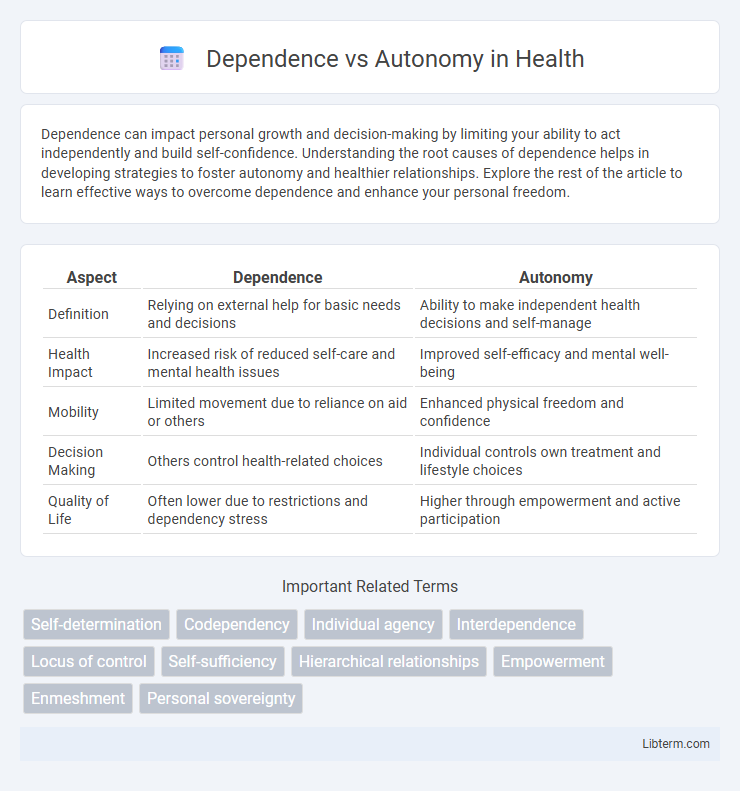Dependence can impact personal growth and decision-making by limiting your ability to act independently and build self-confidence. Understanding the root causes of dependence helps in developing strategies to foster autonomy and healthier relationships. Explore the rest of the article to learn effective ways to overcome dependence and enhance your personal freedom.
Table of Comparison
| Aspect | Dependence | Autonomy |
|---|---|---|
| Definition | Relying on external help for basic needs and decisions | Ability to make independent health decisions and self-manage |
| Health Impact | Increased risk of reduced self-care and mental health issues | Improved self-efficacy and mental well-being |
| Mobility | Limited movement due to reliance on aid or others | Enhanced physical freedom and confidence |
| Decision Making | Others control health-related choices | Individual controls own treatment and lifestyle choices |
| Quality of Life | Often lower due to restrictions and dependency stress | Higher through empowerment and active participation |
Understanding Dependence and Autonomy
Dependence involves relying on external support for decision-making, emotional needs, or resources, often limiting personal growth and self-efficacy. Autonomy reflects the capacity to self-regulate, make independent choices, and take responsibility for outcomes, promoting psychological well-being and resilience. Understanding the balance between dependence and autonomy is essential for fostering healthy relationships and personal development.
Key Differences Between Dependence and Autonomy
Dependence involves relying on others for support, decision-making, or resources, whereas autonomy signifies self-governance, independence, and the ability to make choices without external control. Key differences include the level of control, responsibility, and self-sufficiency, with dependence often linked to vulnerability and autonomy associated with empowerment and personal accountability. Understanding these distinctions helps in fostering personal growth, healthy relationships, and effective leadership.
Psychological Roots of Dependence
Psychological roots of dependence often stem from early childhood experiences where inconsistent caregiving or unmet emotional needs foster attachment insecurities, leading individuals to rely heavily on others for validation and support. This reliance can manifest as reduced self-efficacy and difficulties in decision-making, reinforcing a cycle of dependence that hampers personal autonomy. Understanding these underlying psychological factors is essential for developing strategies that promote independence and healthy self-regulation.
The Benefits of Cultivating Autonomy
Cultivating autonomy enhances decision-making skills, fosters intrinsic motivation, and promotes personal growth by encouraging individuals to take responsibility for their actions. Autonomy supports resilience and adaptability in dynamic environments, enabling individuals to navigate challenges with confidence and creativity. Research shows that autonomous individuals experience higher satisfaction and productivity, contributing positively to both personal and professional success.
Social and Cultural Influences on Dependence
Social and cultural influences significantly shape dependence by defining acceptable levels of reliance within communities, often rooted in collectivist or individualist traditions. In collectivist societies, dependence is encouraged through strong familial ties and communal support systems, reinforcing interdependence as a social norm. Contrastingly, individualistic cultures promote autonomy by valuing personal independence and self-reliance, reducing social acceptance of extended dependence.
The Role of Family in Shaping Autonomy
Family dynamics critically influence an individual's development of autonomy by providing emotional support and setting behavioral boundaries. Parenting styles, including authoritative and permissive approaches, significantly affect the balance between dependence and independence. Early family interactions shape decision-making skills and self-confidence, ultimately determining the degree of autonomy attained in adulthood.
Dependence versus Autonomy in Relationships
Dependence in relationships often involves relying on a partner for emotional support, decision-making, and validation, which can limit personal growth and self-confidence. Autonomy fosters healthy boundaries, encouraging individuals to maintain a sense of self and independence while still nurturing connection and mutual respect. Balancing dependence and autonomy is crucial for long-term relationship satisfaction and emotional well-being.
Striking a Healthy Balance: Dependence and Autonomy
Striking a healthy balance between dependence and autonomy involves recognizing when seeking support enhances growth without compromising independence. Effective strategies prioritize interdependence, where collaboration and self-reliance coexist to boost decision-making and emotional resilience. Cultivating this equilibrium contributes to improved mental health, stronger relationships, and sustainable personal development.
Overcoming Excessive Dependence
Overcoming excessive dependence requires fostering autonomy by developing critical thinking skills and self-efficacy. Building confidence through goal-setting and problem-solving empowers individuals to make independent decisions and reduce reliance on others. Consistent practice of self-reliance enhances resilience and promotes long-term personal growth.
Strategies to Foster Personal Autonomy
Cultivating personal autonomy involves setting clear boundaries and encouraging decision-making that aligns with individual values and goals. Implementing goal-setting frameworks like SMART goals enhances self-regulation and accountability. Providing opportunities for skill development through workshops and reflective practices promotes confidence and independent problem-solving.
Dependence Infographic

 libterm.com
libterm.com